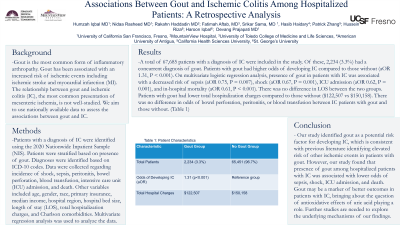Sunday Poster Session
Category: Colon
P0225 - Associations Between Gout and Ischemic Colitis Among Hospitalized Patients: A Retrospective Analysis
Sunday, October 27, 2024
3:30 PM - 7:00 PM ET
Location: Exhibit Hall E

Has Audio

Rakahn Haddadin, MD
MountainView Hospital
Las Vegas, NV
Presenting Author(s)
Humzah Iqbal, MD1, Nidaa Rasheed, MD1, Rakahn Haddadin, MD2, Fatimah Aftab, BS3, Srikar Sama, MD1, Hasib Haidary, BS4, Patrick Zhang, BS5, Hussein Riza, BS6, Haroon Iqbal, BS6, Devang Prajapati, MD1
1University of California San Francisco, Fresno, CA; 2MountainView Hospital, Las Vegas, NV; 3University of Toledo College of Medicine and Life Sciences, Toledo, OH; 4American University of Antigua, Irvine, CA; 5California Health Sciences University, Fresno, CA; 6St. George's University, Irvine, CA
Introduction: Gout is the most common form of inflammatory arthropathy. Gout has been associated with an increased risk of ischemic events including ischemic stroke and myocardial infarction (MI). The relationship between gout and ischemic colitis (IC), the most common presentation of mesenteric ischemia, is not well-studied. We aim to use nationally available data to assess the associations between gout and IC.
Methods: Patients with a diagnosis of IC were identified using the 2020 Nationwide Inpatient Sample (NIS). Patients were stratified based on presence of gout. Diagnoses were identified based on ICD-10 codes. Data were collected regarding incidence of shock, sepsis, peritonitis, bowel perforation, blood transfusion, intensive care unit (ICU) admission, and death. Other variables included age, gender, race, primary insurance, median income, hospital region, hospital bed size, length of stay (LOS), total hospitalization charges, and Charlson comorbidities. Multivariate regression analysis was used to analyze the data.
Results: A total of 67,685 patients with a diagnosis of IC were included in the study. Of these, 2,234 (3.3%) had a concurrent diagnosis of gout. Patients with gout had higher odds of developing IC compared to those without (aOR 1.31, P < 0.001). On multivariate logistic regression analysis, presence of gout in patients with IC was associated with a decreased risk of sepsis (aOR 0.75, P = 0.007), shock (aOR 0.67, P = 0.001), ICU admission (aOR 0.62, P = 0.001), and in-hospital mortality (aOR 0.61, P < 0.001). There was no difference in LOS between the two groups. Patients with gout had lower total hospitalization charges compared to those without ($122,507 vs $150,158). There was no difference in odds of bowel perforation, peritonitis, or blood transfusion between IC patients with gout and those without.
Discussion: Our study identified gout as a potential risk factor for developing IC, which is consistent with previous literature identifying elevated risk of other ischemic events in patients with gout. However, our study found that presence of gout among hospitalized patients with IC was associated with lower odds of sepsis, shock, ICU admission, and death. Gout may be a marker of better outcomes in patients with IC, bringing about the question of antioxidative effects of uric acid playing a role. Further studies are needed to explore the underlying mechanisms of our findings.
Disclosures:
Humzah Iqbal, MD1, Nidaa Rasheed, MD1, Rakahn Haddadin, MD2, Fatimah Aftab, BS3, Srikar Sama, MD1, Hasib Haidary, BS4, Patrick Zhang, BS5, Hussein Riza, BS6, Haroon Iqbal, BS6, Devang Prajapati, MD1. P0225 - Associations Between Gout and Ischemic Colitis Among Hospitalized Patients: A Retrospective Analysis, ACG 2024 Annual Scientific Meeting Abstracts. Philadelphia, PA: American College of Gastroenterology.
1University of California San Francisco, Fresno, CA; 2MountainView Hospital, Las Vegas, NV; 3University of Toledo College of Medicine and Life Sciences, Toledo, OH; 4American University of Antigua, Irvine, CA; 5California Health Sciences University, Fresno, CA; 6St. George's University, Irvine, CA
Introduction: Gout is the most common form of inflammatory arthropathy. Gout has been associated with an increased risk of ischemic events including ischemic stroke and myocardial infarction (MI). The relationship between gout and ischemic colitis (IC), the most common presentation of mesenteric ischemia, is not well-studied. We aim to use nationally available data to assess the associations between gout and IC.
Methods: Patients with a diagnosis of IC were identified using the 2020 Nationwide Inpatient Sample (NIS). Patients were stratified based on presence of gout. Diagnoses were identified based on ICD-10 codes. Data were collected regarding incidence of shock, sepsis, peritonitis, bowel perforation, blood transfusion, intensive care unit (ICU) admission, and death. Other variables included age, gender, race, primary insurance, median income, hospital region, hospital bed size, length of stay (LOS), total hospitalization charges, and Charlson comorbidities. Multivariate regression analysis was used to analyze the data.
Results: A total of 67,685 patients with a diagnosis of IC were included in the study. Of these, 2,234 (3.3%) had a concurrent diagnosis of gout. Patients with gout had higher odds of developing IC compared to those without (aOR 1.31, P < 0.001). On multivariate logistic regression analysis, presence of gout in patients with IC was associated with a decreased risk of sepsis (aOR 0.75, P = 0.007), shock (aOR 0.67, P = 0.001), ICU admission (aOR 0.62, P = 0.001), and in-hospital mortality (aOR 0.61, P < 0.001). There was no difference in LOS between the two groups. Patients with gout had lower total hospitalization charges compared to those without ($122,507 vs $150,158). There was no difference in odds of bowel perforation, peritonitis, or blood transfusion between IC patients with gout and those without.
Discussion: Our study identified gout as a potential risk factor for developing IC, which is consistent with previous literature identifying elevated risk of other ischemic events in patients with gout. However, our study found that presence of gout among hospitalized patients with IC was associated with lower odds of sepsis, shock, ICU admission, and death. Gout may be a marker of better outcomes in patients with IC, bringing about the question of antioxidative effects of uric acid playing a role. Further studies are needed to explore the underlying mechanisms of our findings.
Disclosures:
Humzah Iqbal indicated no relevant financial relationships.
Nidaa Rasheed indicated no relevant financial relationships.
Rakahn Haddadin indicated no relevant financial relationships.
Fatimah Aftab indicated no relevant financial relationships.
Srikar Sama indicated no relevant financial relationships.
Hasib Haidary indicated no relevant financial relationships.
Patrick Zhang indicated no relevant financial relationships.
Hussein Riza indicated no relevant financial relationships.
Haroon Iqbal indicated no relevant financial relationships.
Devang Prajapati indicated no relevant financial relationships.
Humzah Iqbal, MD1, Nidaa Rasheed, MD1, Rakahn Haddadin, MD2, Fatimah Aftab, BS3, Srikar Sama, MD1, Hasib Haidary, BS4, Patrick Zhang, BS5, Hussein Riza, BS6, Haroon Iqbal, BS6, Devang Prajapati, MD1. P0225 - Associations Between Gout and Ischemic Colitis Among Hospitalized Patients: A Retrospective Analysis, ACG 2024 Annual Scientific Meeting Abstracts. Philadelphia, PA: American College of Gastroenterology.
